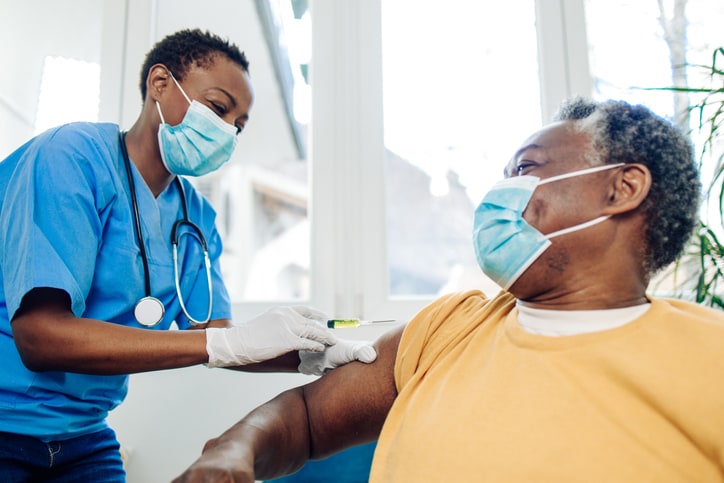As COVID continues to evolve, experts have been hard at work trying to nail down the best vaccine schedule to limit COVID transmission and keep vulnerable people safe. After convening last week, the Food and Drug Administration (FDA) and the Centers for Disease Control and Prevention (CDC) just announced that certain seniors and other groups are eligible for a bivalent booster shot.
Who can get another COVID booster?
The CDC’s Advisory Committee on Immunization Practices (ACIP) made the decision about additional COVID boosters as a part of their ongoing push to simplify vaccine recommendations. Under the latest guidelines, the following groups are approved to receive a booster dose of the bivalent COVID vaccine:
- Seniors ages 65 and older
- Immunocompromised people
Those who’ve previously been vaccinated with a bivalent COVID shot should only get a booster if it’s been at least four months since their last shot.
Adults 64 and younger who’ve already received a bivalent COVID shot don’t need to get another one at this time; however, if you’re in this age group and haven’t yet had a dose of the bivalent vaccine, the CDC made it’s strongest recommendation for getting the updated shot now.
“CDC recommends that everyone ages 6 years and older receive an updated (bivalent) mRNA COVID-19 vaccine, regardless of whether they previously completed their (monovalent) primary series,” a press release states.
What is the bivalent COVID vaccine?
The bivalent COVID shot was first made available in September 2022. Unlike the original monovalent COVID vaccines, the updated shot contains spike protein components from omicron variants BA.4 and BA.5, which offer increased protection against many of the newer COVID variants currently circulating in the U.S.
During the fall and winter, seniors who received the bivalent COVID vaccine died at far lower rates than unvaccinated seniors or those who had only received the original monovalent vaccine.
Why do seniors need another COVID booster?
For seniors who’ve already received the bivalent vaccine, evidence shows that protection against the virus wanes over time. According to the FDA, getting a booster can help restore immunity and protect against severe COVID symptoms.
Seniors and those with compromised immune systems face the highest risk of hospitalization and death from a COVID infection. Unfortunately, despite the known COVID risks to this population, only 42% of people ages 65 and over have gotten the bivalent COVID vaccine. The FDA hopes the new recommendations will encourage more Americans, particularly seniors and those with immune conditions, to stay up-to-date on their vaccinations.
“COVID-19 continues to be a very real risk for many people, and we encourage individuals to consider staying current with vaccination, including with a bivalent COVID-19 vaccine,” says Peter Marks, the FDA’s Center for Biologics Evaluation and Research Director. “The available data continue to demonstrate that vaccines prevent the most serious outcomes of COVID-19, which are severe illness, hospitalization and death.”
Where can seniors get a bivalent COVID vaccine?
Bivalent vaccines are available at many doctor’s offices, pharmacies and senior centers throughout the country. The CDC also offers several resources for finding the most convenient location to get vaccinated near you.
You can text a zip code to 438829 or call 1(800)-232-0233. You can also visit Vaccines.gov and enter your information to find vaccine providers near you.
As always, it’s important to consult with a doctor if you have any questions about the vaccine or when and where you or an older loved one can get the shot.





